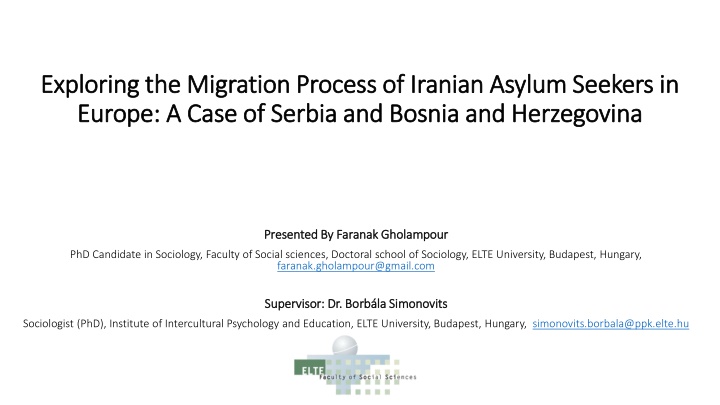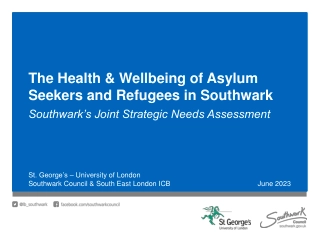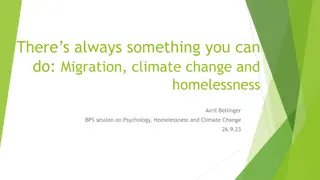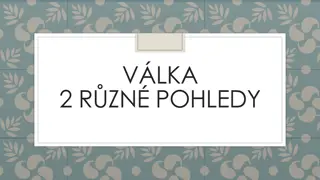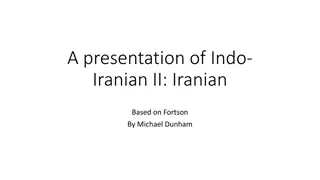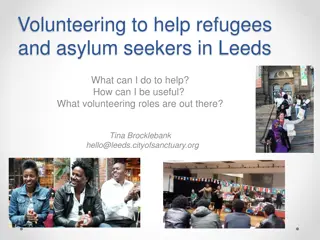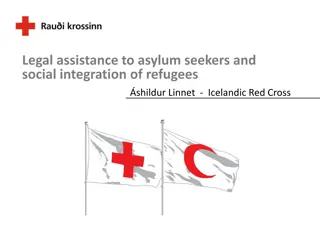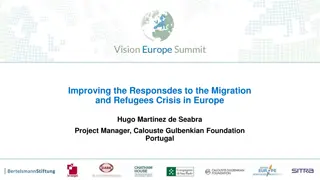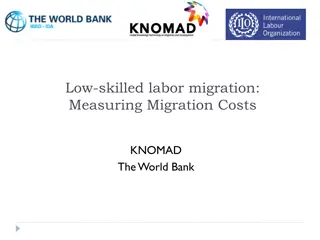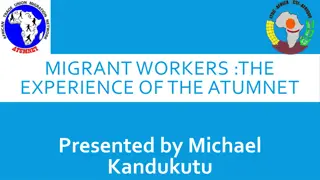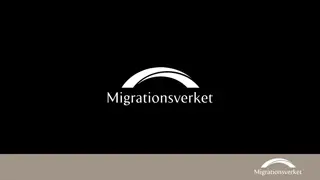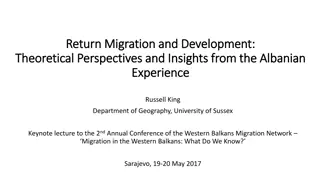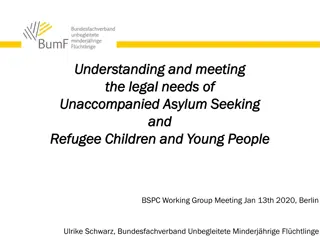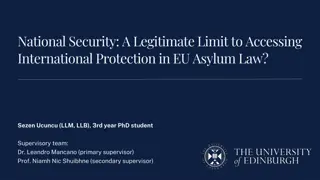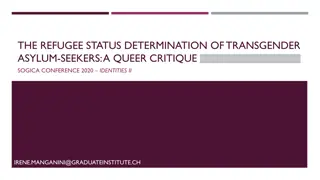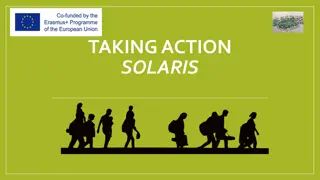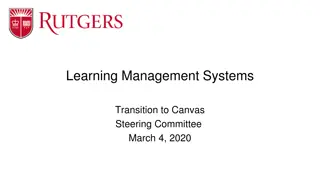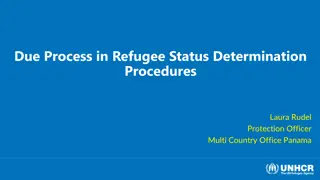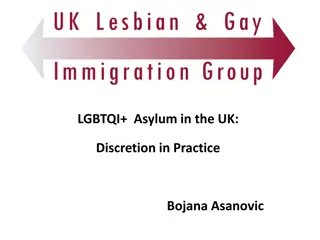Migration Process of Iranian Asylum Seekers in Europe: A Case Study
This study examines the migration process of Iranian asylum seekers in Europe, particularly focusing on Serbia and Bosnia and Herzegovina. It delves into the motivations behind their migration, challenges they face, and key research questions. Theoretical backgrounds and methodologies are explored to provide insights into this significant phenomenon.
Download Presentation

Please find below an Image/Link to download the presentation.
The content on the website is provided AS IS for your information and personal use only. It may not be sold, licensed, or shared on other websites without obtaining consent from the author.If you encounter any issues during the download, it is possible that the publisher has removed the file from their server.
You are allowed to download the files provided on this website for personal or commercial use, subject to the condition that they are used lawfully. All files are the property of their respective owners.
The content on the website is provided AS IS for your information and personal use only. It may not be sold, licensed, or shared on other websites without obtaining consent from the author.
E N D
Presentation Transcript
Exploring the Migration Process of Iranian Asylum Seekers in Exploring the Migration Process of Iranian Asylum Seekers in Europe: A Case of Serbia and Bosnia and Herzegovina Europe: A Case of Serbia and Bosnia and Herzegovina Presented PresentedBy ByFaranak FaranakGholampour Gholampour PhD Candidate in Sociology, Faculty of Social sciences, Doctoral school of Sociology, ELTE University, Budapest, Hungary, faranak.gholampour@gmail.com Supervisor Supervisor: Dr. Borb la : Dr. Borb la Simonovits Simonovits Sociologist (PhD), Institute of Intercultural Psychology and Education, ELTE University, Budapest, Hungary, simonovits.borbala@ppk.elte.hu
Structure of the presentation Structure of the presentation Brief definitions, Statistics Brief definitions, Statistics Introduction Introduction Theoretical Theoretical Background Background Theories, Theories, The main research questions The main research questions Participants, Procedure and data analysis Participants, Procedure and data analysis Methodology Methodology The findings The findings Results Results Limitations Limitations of the research of the research Limitations Limitations
Irregular migration: Irregular migration: Who are asylum seekers?
The main The main transit transit countries countries in Europe? in Europe? (Greider, 2017)
Theoretical Theoretical background background Motivation of Motivation of migration migration Migration decision Migration decision making: Rational making: Rational choice theory choice theory Push and pull Push and pull factors factors Social capital theory Social capital theory and network theory and network theory
The main research questions: The main research questions: Q1. What is the motivation of Iranian asylum seekers for leaving Iran? Q2. What are the most difficulties Iranian asylum seekers face in Europe?
Methodology Methodology Research Design Translation from Translation from Persian to English/ Persian to English/ Coding Coding Sid refugee camp in Serbia/ Sedra refugee camp in B&H Qualitative, semi Qualitative, semi- - structured interview structured interview Purposive and snowball sampling
N Range M 17 19-46 36.00 Participant s age Sex Male Female 11 6 Ethnicity Persian 10 Arabic 1 Participants Socio Participants Socio- - demographic demographic characteristics: characteristics: Kurdish 5 Baloch 1 Marital status Married 12 Widow(er) 1 Single Divorced 3 1 Education No schooling completed 1 Some high school, no diploma 4 Diploma or the equivalent 9 2 Bachelor s degree 1 Master s degree
What was the main reason for leaving Iran? (N=7) Lack of job security Results: Results: 5 4 Religious persecution Lack of social freedom 3 Motivation Motivation of migration of migration 2 1 0 Family issues in Iran Economic issues Prefer not to say the main reason Political issues
Lack of job security Lack of job security (5 (5 interviewees interviewees) ) Although I had 130 contractors who were working under my supervision and I was checking their work, they retrenched me [...] After that, I was seeking a job for about 2 years and I became tired. My main reason for leaving Iran was the lack of job security. [...] I studied a lot, and I was educated, why should I lose my job in Iran? This really annoyed and irritated me. (No. 4, 40 years old, male)
Lack of social freedom Lack of social freedom (4 interviewees) (4 interviewees) My son called me and said the police had arrested him. They arrested my son because he was playing water shooting with other boys and girls. Police slapped him in the face at the police station and because it was Ramadan, he was flogged one time by a whip on his back and they took a written commitment from him. [...] That was just one thing, we did not have freedom. We were involved with everyday problems, and were told what to do or not, or will be arrested for no reason. (No. 1, 46 years old, female)
Economic issues Economic issues (4 interviewees) (4 interviewees) You know that the economic situation in Iran is a disaster. My husband and I both were working, and our life was not bad, it was good, but we were going to get into financial pro- blems and could not respond to our children s needs. (No. 1, 46 years old, female)
Political reasons Political reasons (3 interviewees) (3 interviewees) Someone, maybe a neighbor, from the village ratted me out and called the Guard Corps. [...] We could not go back home because they execute anyone who supports Peshmergas. We stayed at my sister s place for the night, but the Guard Corps were following us and wanted to catch me. (No. 8, 35 years old, male)
Prefer not to say Prefer not to say (3 interviewees) (3 interviewees) I was forced to leave Iran otherwise I would never have left Iran because my job position was good, my income was good and I lived in a good place, everything was good, and I was com- fortable. [...] Immigration was nothing but a hassle for us. I cannot tell you my main reason for leaving Iran. I had to leave Iran but there are economic issues, political issues, lack of democracy in Iran, you should see what is not an issue in Iran. (No. 6, 42 years old, male)
Family issues in Iran Family issues in Iran (2 interviewees) (2 interviewees) We had a lot of problems with my husband s family. [...] My son also had a lot of problems too. Someone committed murder and put all the faults on my son. [...] My son was acquitted by the court, but he was annoyed every day because of something he did not do. (No. 2, 40 years old, female)
Religious persecution Religious persecution (1 interviewee) (1 interviewee) They sent me to the jail, accused of disturbing the public opinion and country officials by correspondence and writing letters about Sufi s problems. [...] I was accused of blasphemy too because I did not have religious education in Qom Seminary, and I shaved my beard once in the past. So, I was sentenced to 5 years in prison for insulting the sanctities of Islam and I was flogged 75 times by whip for writing letters to country officials and I also was sentenced to be exiled to Shahre Babak in Kerman province for 10 years. (No. 3, 40 years old, male)
Immigrants social networks Immigrants social networks I talked to my aunt when she was in Serbia, she left Iran before us. She said camps and everything is fine in Serbia. My aunt felt fine when she was in Serbia, but it was not okay when I was in Serbia myself. (No. 7, 19 years old, male)
The route from Iran to The route from Iran to Europe Europe Asylum seekers took two main routes from departure: The land border with Turkey (7 interviewees) Flew from Iran to Turkey or Serbia (10 interviewees) (DW, 2016)
Experiences/difficulties on the way Experiences/difficulties on the way Problem with Problem with Croatian policemen Croatian policemen (7 interviewees): We walked from Sid city to Croatia. [...] We crossed Croatia and were about 50 km to Slovenia when the Croatian police caught us in the forest. They did not do anything to our children. But we were about seven adults. We were all beaten by them. They broke our cell phones. Men were beaten in front of their women and children. We were put in a car and dropped off near Sid city again. (No. 10, 45 years old, male) (7 interviewees): Problem Problem with the smugglers (All interviewees): with the smugglers (All interviewees): In Greece, we paid 1,000 EUR each person to a smuggler to take us from Greece to Serbia. When we arrived in Macedonia, I was a hostage in the smuggler s home for about two months. I was harassed a lot by him. My 1.5-year-old daughter was beaten by the smuggler. He took money from me but did not take me to Serbia. One day I decided to move to Serbia myself. I gave clothes, shoes, food, money, and whatever I had to Macedonian people just to show me the route to Serbia. (No. 14, 24 years old, female)
Living c Living condition onditions s in the of residence of residence in the country country 1. 1. Adaptation Participation in language classes Using some Serbian or Bosnian words while interacting with locals Local friends Like to be in touch with both locals and Iranian communities Like their national identity No difficulties in adjusting to the weather
2. 2. Camp situation Camp situation Camp conditions Health, medical, and counseling services Dentistry is not good here at all. Because we do not pay money and it is free. My toothache has reached the nerve and I have nerve pain now. I went to the camp dental clinic and they just wanted to extract my tooth. I asked them for a root canal treatment, and they said we only pull out the tooth. (No. 1, 46 years old, female)
3. Discrimination 3. Discrimination(2 interviewees) (2 interviewees) I do not know what kind of individuals these local people have encountered with before, but I feel insulted in the shops when someone stands over me and stares at me while I am shop- ping. Maybe something was really stolen from them, I do not know. [...] In Serbia, their eyes are on you all the time as if you want to steal something. Even if you say something is expensive, they will say we do not have this product at all or we do not sell it at all. (No. 11, 38 years old, male)
The limitation of the study The limitation of the study Highly influenced by COVID-19 pandemic The sample size Limit the generalizability of the result
References References DW. (2016). Slovenia, Serbia and Croatia move to close migrant route. Retrieved from https://www.dw.com/en/slovenia-serbia-and-croatia-move-to-close-migrant-route/a-19102872 Greider, A. (2017). Outsourcing Migration Management: The Role of the Western Balkans in the European Refugee Crisis. Retrieved from https://www.migrationpolicy.org/article/outsourcing-migration-management- western-balkans-europes-refugee-crisis
